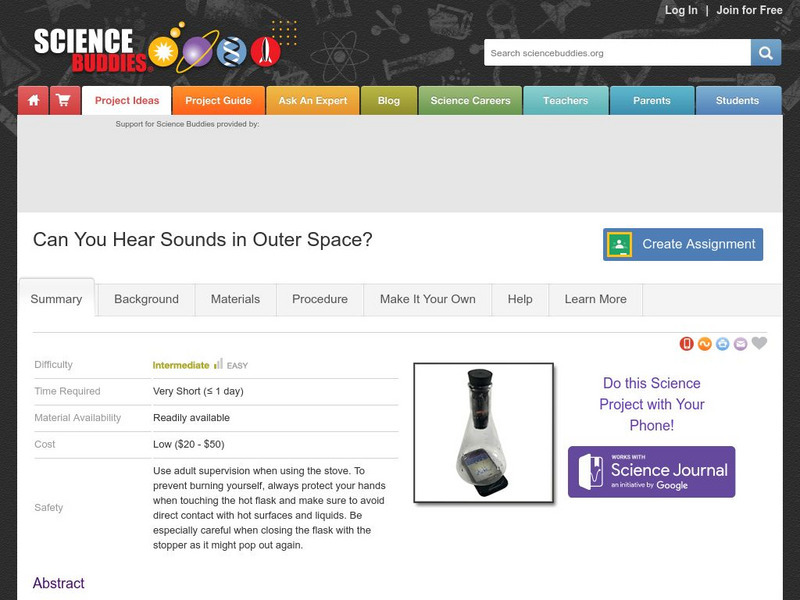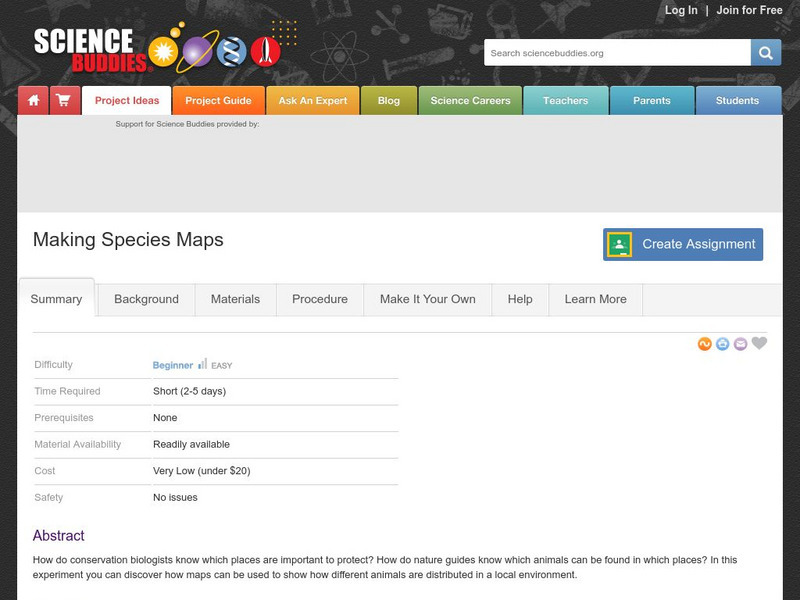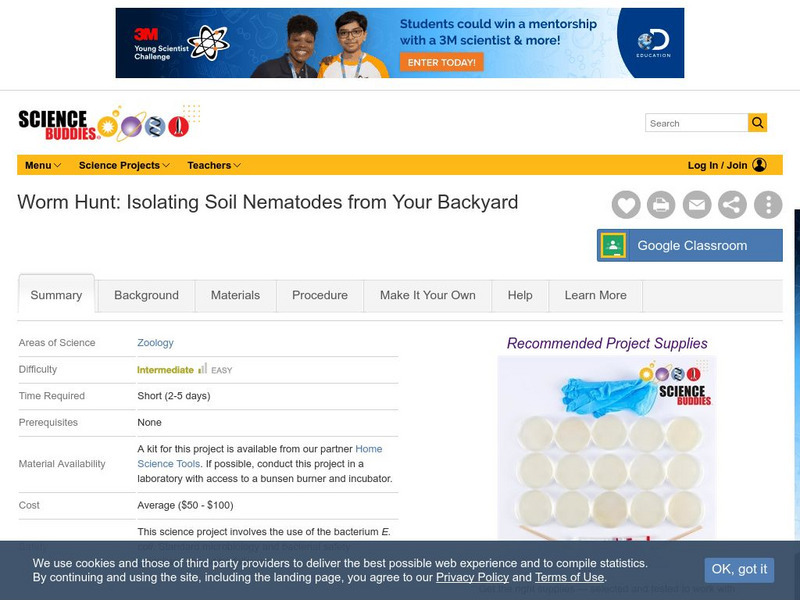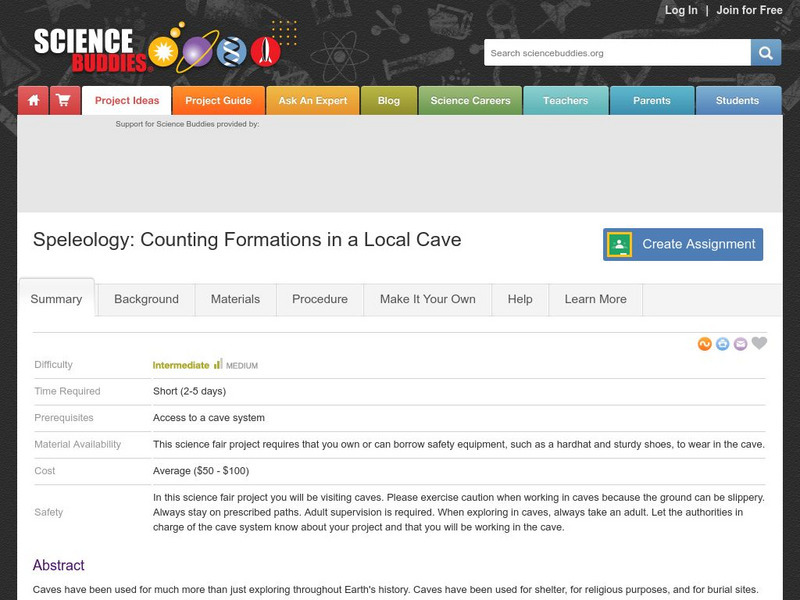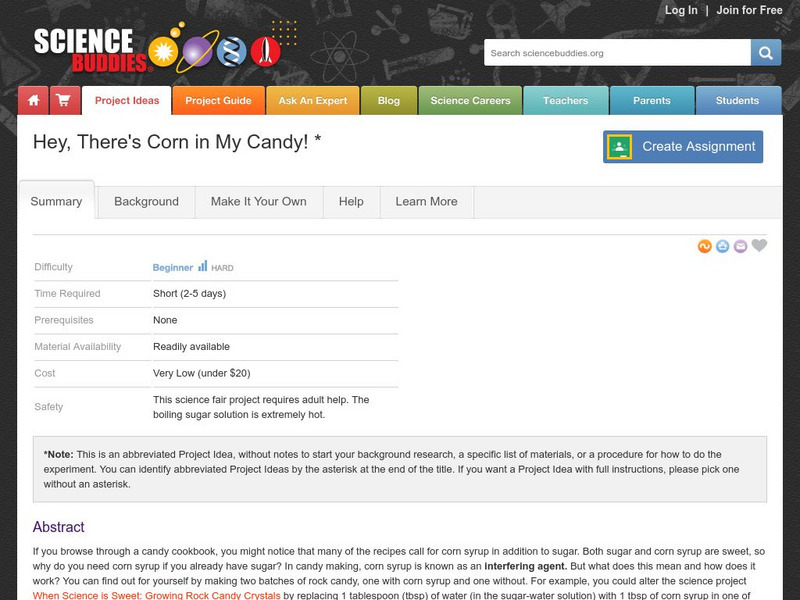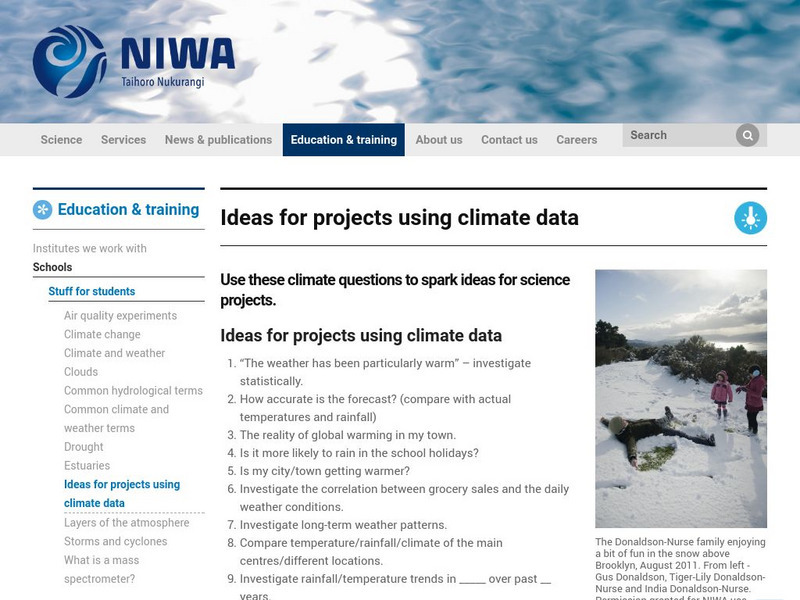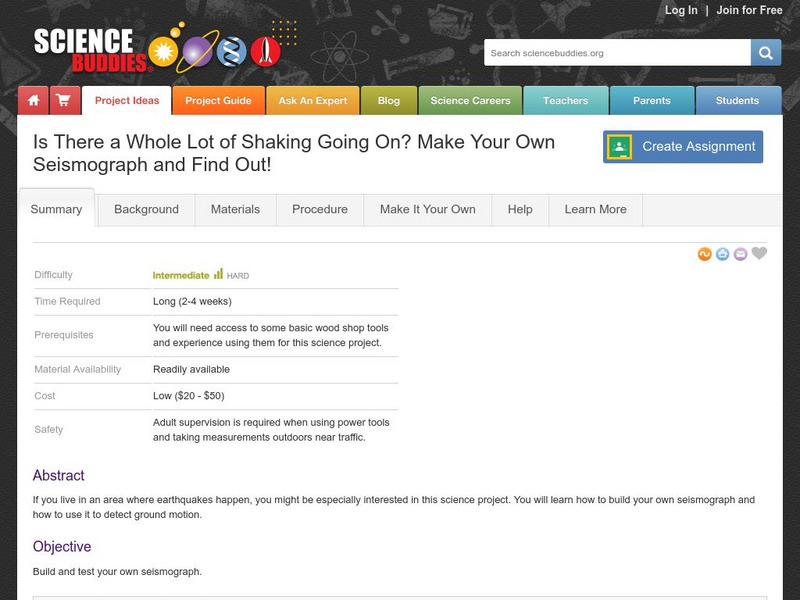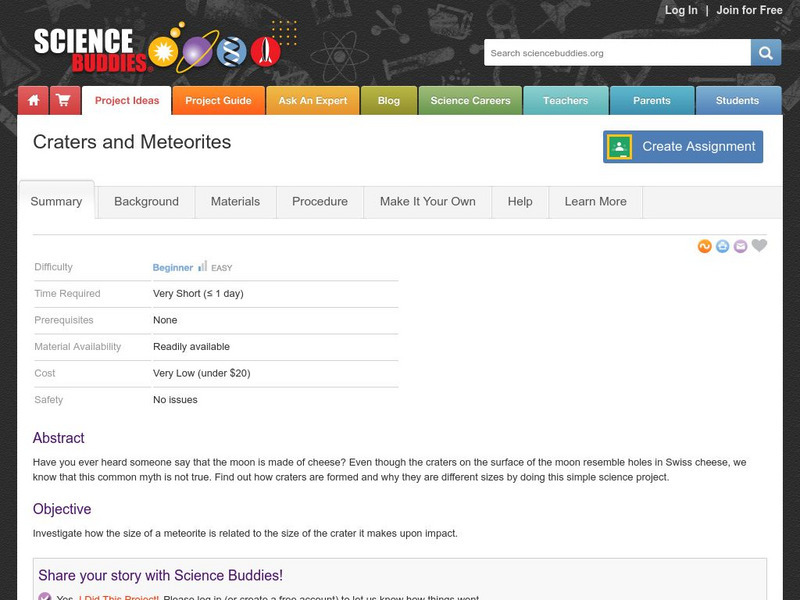Science Buddies
Science Buddies: Solving a 'Windy' Problem
The wind is a powerful force, enough to erode whole hillsides over time. Building structures in windy environments challenge civil engineers with special safety concerns. A wall in a windy area can either shield you from the cold or fall...
Science Buddies
Science Buddies: Outer Space, the Silent Frontier: An Experiment on Sound Waves
In outer space there is utter silence. There are no sounds of traffic jams or thunderstorms or crashing waves. No buzzing bees or babies crying. Just silence. In this experiment, you will discover why empty space is void of sound.
Science Buddies
Science Buddies: Making Species Maps
Conservation biologists know which places are important to protect. How nature guides know which animals can be found in which places, are made possible partly by conservation biology. This experiment allows you to discover how maps can...
Science Buddies
Science Buddies: You've Got Permission to Be a Backseat Driver!
You can see what happens to your car's fuel efficiency when it takes you downtown to see a movie, up a hill for a great view, or out for a cruise on a flat country road. This is because a car's fuel efficiency does not remain the same...
Science Buddies
Science Buddies: Sorting Out Sedimentation
Sedimentary rock forms in layers that are deposited one after the other over long periods of time. Oftentimes, sedimentary rock contains fossils and other debris that are deposited within the layers. Use this experiment to investigate...
Science Buddies
Science Buddies: Bottled Up Buoyancy
Sure you understand what makes submarines cool, they allow us go underwater and explore the sea! But understanding how they function is a completely different matter. This lab will help you investigate how submarines dive and surface by...
Science Buddies
Science Buddies: Worm Hunt: Isolating Soil Nematodes From Your Backyard
Nematodes, also called roundworms, are the most abundant animal on Earth and can be found in your back yard, playgrounds, and many other places. This lab involves isolating nematodes from several soil samples to discover the best...
Science Buddies
Science Buddies: Speleology: Counting Formations in a Local Cave
In the past caves have been used for shelter, for religious purposes, and for burial sites. They were even used for food storage before refrigeration, because they are cool and have constant high humidity. Get ready for an adventure as...
Science Buddies
Science Buddies: Are There Bugs Under Your Feet?
Within the grass there are millions of micro-invertebrates. Learn how to catch them by making a Berlese funnel in this fun project that will teach you about soil.
Science Buddies
Science Buddies: Hey, There's Corn in My Candy!
In candy making, corn syrup is known as an "interfering agent." You can find out just what this agent does by making two batches of lollipops, one with corn syrup and one without and examining the differences between the two. Once you...
Science Buddies
Science Buddies: Candy Chromatography: What Makes Those Colors?
One of the characteristics that makes M&Ms so popular is dye that colors the hard shell, and of course the chocolate. But, many are unaware of what dyes are used to make those colors. This day long lab uses paper chromatography to...
Other
Buzzle.com: Science Articles
This website provides information on a wide range of science topics, as well as some ideas for experiments and science fair projects. It's a good resource for students doing research.
Other
Niwa: Ideas for Projects Using Climate Data
Need an idea for a science project? Interested in climate data? This site contains a list of questions related to climate data that could be used for a science project.
NOAA
Noaa: Environmental Restoration
Your questions answered about environmental restoration after chemical accidents. A large section is dedicated to oil spills and how they contaminate the earth. Great information.
Ducksters
Ducksters: Kids Science: Projects and Experiments
Kids learn by experimenting with science. Ideas for scientific projects on weather, sound, electricity, ecology.
Science Buddies
Science Buddies: What's All That Shaking? Make Your Own Seismograph!
If you live in an area where earthquakes happen, you might be especially interested in this science project. You'll learn how to build your own seismograph and how to use it to detect ground motion.
Science Buddies
Science Buddies: Get Some Practice at 'Fossil' Reconstruction With Owl Pellets
Although this project is not based on actual fossils, you will get good practice at reconstructing an animal's skeleton from individual bones. The goal of this science project is to identify the types of prey that are consumed by owls by...
Science Buddies
Science Buddies: Forensics: How Does It Matter? Measure the Spatter!
Every criminal leaves behind evidence at the crime scene. The trick to catching the criminal is collecting all of the evidence and making sense of it. This is what the forensic expert does. In this science project you will be correlating...
Science Buddies
Science Buddies: Make Your Own Markers
Do you ever wonder how markers are made? Where do all of those colors come from? Many of the colorful dyes we use come from plant pigments. Pigments are what make the world around us so colorful. How do chemists turn those natural plant...
Science Buddies
Science Buddies: Craters and Meteorites
Have you ever heard that the moon is made of cheese? Even though the craters on the surface of the moon resemble holes in Swiss cheese, we know that this common myth is not true. Find out how craters are formed and why they are different...
Science Buddies
Science Buddies: Do Preferences Bias Our Choices?
In this science project you will test whether color preference will affect repetitive tasks that require fine motor coordination, like picking up small objects very quickly. Find out if your color preferences will bias these repetitive...
Science Buddies
Science Buddies: Where There Is Charge, There Can Be Sparks!
In this short science project you will learn how to build a capacitor using common household items. By testing different charge cycles, you will work to discover how much charge is stored in a Leyden jar capacitor.
Science Buddies
Science Buddies: Moving Water With the Archimedes Screw Pump
Amaze your friends and family by moving water with just a few turns of your wrist, this is known as an Archimedes screw. In this science project, you will build a very simple Archimedes screw, to transfer water from a low-lying location...
Science Buddies
Science Buddies: What Color Are the Leaves Really Turning?
Everyone loves the beautiful colors of fall, but where they come from and how they change color is a mystery. In this project, you will uncover the hidden colors of fall by separating plant pigments with paper chromatography.



